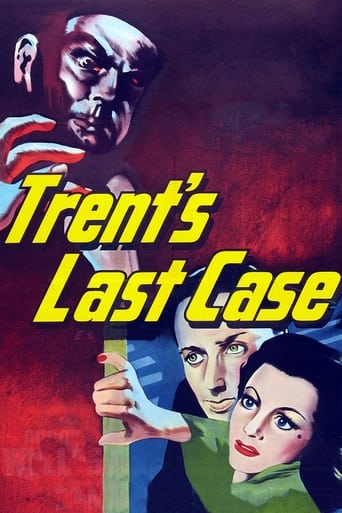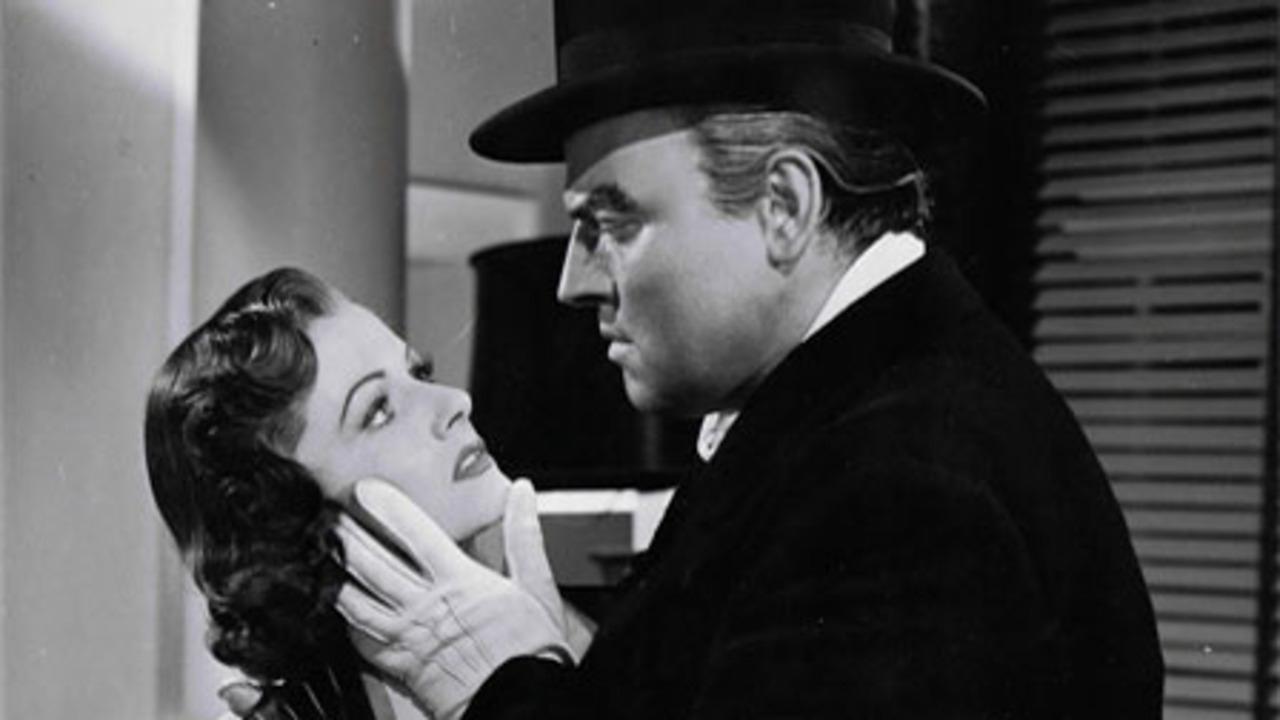AlanBryan2112
One other reviewer stated this so well: "If it weren't for the presence of Orson Welles as the ostensible murder victim in Trent's Last Case, this rather indifferent British murder mystery would be consigned to blessed obscurity. For that the rest of the cast should be grateful."I agree. Not only was I bored to death it took me 3 weeks to get through this thing a few minutes at a time. The film look nice. All the male leads are charming. The female lead is gorgeous, but has little to do except mourn, play the piano, and look sad some more. When Welles does appear (in flashback); he quite over the top and you WANT him to die. Our detective doesn't do very much and somehow gets the girl in the end. Bah!
howardmorley
Unlike the other reviewers above, I enjoyed this film immensely, probably because I am a Margaret Lockwood fan and collect as many of her films as I can when they are available.This one is not commercially available but I managed to find a dealer on Ebay who specialises in the older films I like.The other reviewers mention it is too "talky" but this is not supposed to be "Die Hard" or even a James Bond adventure.It is a cultured British film, from Republic films, from 1952 with an excellent cast who speak with wonderful diction and enunciation before "kitchen sink drama" mesmerised film producers.Herbert Wilcox (Anna Neagle's husband) produced this gripping thriller that keeps you guessing right up to the very end.I will concede that the plot is at times a bit like an amateur dramatic society but this gives it its intrinsic charm especially when the principal parts are played by good professional actors.An example is Orson Wells sitting in an armchair and filmed from the rear redolent of a James Bond villain.He only needed to be stroking a white cat on his lap!! Michael Wilding plays his usual debonair self as "Philip Trent" the artistic crime reporter.Margaret Lockwood plays again the pianoforte (see my critique of "Love Story" (1944) when she played Lissa Campbell),This time we have the pleasure of listening to Eileen Joyce (the real pianist) playing the famous Mozart piano concerto no:24 in C minor, larghetto movement.Eileen's other famous film credit was playing the Rachmaninov 2nd piano concerto in C minor for "Brief Encounter (1945).Orson as mentioned was fond of Shakespeare's "Othello" and some of this plot is worked into this film.Like "The Third Man" (1949), Orson does not appear until late into the film but he immediately makes his not inconsiderable presence felt as "Sigsbee Manderson".Margaret plays Margaret Manderson his wife.No trouble remembering her name by the cast!John McCallum gives a workmanlike performance as John Marlowe, the secretary to Manderson and Miles Malleson for once leaves aside his clerical garb to play Burton Cupples, Margaret's uncle.What amused me was seeing a very young Kenneth Williams playing a garrulous Welsh gardener! You would only see this film if you you actively set out to acquire it since it never appears on the the TV and as I said is not commercially available.Obviously being a thriller I will not divulge the plot.Suffice to say it ends happily for all concerned.I rated it 8/10. Since I wrote this critique in July 2007 this title is now commercially available from www.silversirens.co.uk Enjoy!
theowinthrop
When TRENT'S LAST CASE first appeared in 1913 it shook up the detective mystery reading public because of the "daring" of the author's approach to the style of the novel. Up to then you had the classic straightforward mystery story from Poe to Collins to Conan Doyle, wherein you have a person who is confronted by a mystery (usually a murder case, although a theft of a jewel or property is possible). The one real innovation in this form was in 1905, when R. Austen Freeman suggested the "inverted detective story". You may be familiar with this if you watch Peter Falk as Inspector Columbo on television. Instead of the hero of the mystery story stumbling onto the scene of the result of the crime, and then piecing together the solution using the clues carefully, Freeman looked at the behavior of the perpetrator (not always a villain, by the way), and how he or she commits the crime, and how the brilliant detective slowly reveals the various inconsistencies that make the crime look less and less an accident than was intended. This became an acceptable development in detective novels.But along came Bentley. He had the audacity to suggest the fallibility of the detective. A Dupin, a Lecoq, a Holmes, a Father Brown, a Dr. Thorndyke, could be momentarily stumped or wrong, but inevitably would solve the mystery. But Bentley suggested that even a brilliant detective like Philip Trent was human - he comes to a wrong solution in this story (he suggests the victim plotted his own suicide to entrap his victim). Instead, Trent's uncle solves the case. It only shows that the trickiness of circumstantial evidence and clues can fool anyone.The story is dated - there was very casually accepted anti-Semitism in British fiction at the time (and since Sigsbee Manderson is extremely rich from stock-market manipulations, the image of Jewish stock brokers is overused in the book and even, at one point, intrudes into the movie - a newspaper editor, dictating an editorial, mentions the death of Manderson leads to suicides and panics including one in Jerusalem!). Bentley was not the only person who wrote like this. Chesterton did (and more vehemently). Even Conan-Doyle (despite his real life aid to Oscar Slater, a Jewish German suspect in a Scots murder case) occasionally used negative terms for Jews - see his "The Adventure of the Stock-Broker's Clerk". Freeman, like Chesterton and Bentley, was more openly bigoted.On the other hand, the story is interesting enough for the viewer to keep his or her opinions on the bigotry aside. The main problem about it is the suspension of disbelief regarding whether a brilliant malevolent millionaire would actually put his being in jeopardy by putting such a weird plot into motion. I suspect not. It would be easier to fire or even kill the rival.In 1952 Orson Welles was working around Europe raising money for projects, chief of which was his movie of OTHELLO. Welles performed in many films, frequently in second rate ones. He agreed to do the role of Manderson, who (like Harry Lime in a better film) only appears on screen in the last quarter of the movie, but whose spirit permeates the entire film. To make the evil millionaire more detestable Welles made the face of Manderson striking but ugly. His eyes are made beetle like by a wide brown under a strikingly straight, large nose. He looks formidable indeed, but utterly untrustworthy, and unlovable.Welles performance (mostly against Margaret Leighton and John McCallan) is pretty good. But most of the film is in the hands of dapper, clever, Michael Wilding. Wilding is not an actor of the same caliber of Welles, but he does nicely with the part of the competent and self-confident Philip Trent. Also doing a nice (and as it turns out, surprising ) job is Miles Malleson as Trent's uncle. For these three I will give the film a six.But that said, the film is otherwise too talky, not enough action (until we see what actually happened - far too late in the film). If not for the performances listed above, this film would be easily dismissible.Well, it would have one other moment of unintentional amusement. A better screenplay writer might have gone to town with a small mistake that Wilding's Trent makes when confronting McCallum. He mentions that he is aware of the latter's brilliant performance (at university) in a production of Shakespeare. The problem is that the play he mentions and the role that McCallum appeared in were not connected (i.e., the role was in another Shakespearean play). I wonder if Wilding and McCallum were aware of the blunder. If they were they didn't show any awareness of it in the filming.
alberto f. cañas
A very dull movie on a novel which was famous because it tried to be the reversal of the usual mystery novels. A long work by the amateur detective which results in an impregnable indictment of the murder, until in the end someone confesses having witnessed what was an accident. The picture is too talky. Even its denouement is talked. No suspense at all. By 1952 Herbert Wilcox had proved not to be the notable director they claimed he was in the thirties. Good performances by Michael Wilding and Orson Welles. Indifferent by an aging Margaret Lockwood.


 AD
AD


